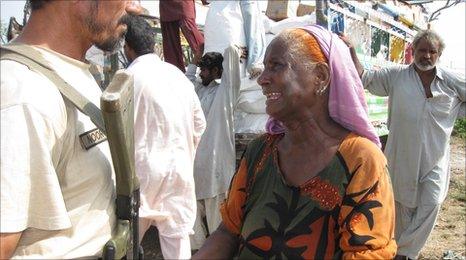Pakistan flood survivors refused aid at relief camps
- Published

As floodwater in Pakistan displaces tens of thousands of people from their homes every day, some are turning up at camps without the documentation necessary to receive aid, adding to the humanitarian crisis. The BBC's Jill McGivering reports from a camp in Sukkur, Sindh province.
Sukkur is overwhelmed.
Along the river banks and canals, on patches of dry ground and alongside the roads, homeless families are sitting or lying in the open air, their possessions piled at their side.
They fled their homes with whatever they could carry as rising floodwater inundated their towns and villages.
Most, unless they find shade under a tree, have no shelter from the scorching sun.
A fraction have places inside the relief camps which have sprung up all across the city.
They consist of rows and rows of tents with simple latrines, and access to these areas is strictly controlled.
Tension high
I entered one camp shortly before a food distribution was about to start.
The World Food Programme was bringing in several trucks with fortified biscuits, flour and cooking oil.
A screening process had already taken place within the camp to decide which families were eligible to receive it.
Many people here are desperate and tensions are running high.
Recently there have been incidents of crowds mobbing aid trucks and people being hurt in the crush and confusion.
So this time the chosen few were regimented, sitting on the ground in neat lines in the glare of the sun, men and women segregated, as armed police officers and rangers stood guard around them.
Jealously watching
Abdul Hamid Bulo, one of the camp organisers, explained why such discipline was being imposed.
"Otherwise people rush over and don't listen," he said.
"People just see there's a distribution of food and they come rushing."
As the trucks rolled in and the distribution began, the recipients were allowed forward one by one to show their identity card and registration papers to officials sitting behind a desk, then have their name ticked off on a printed list.
Beyond the guards, watching jealously, other homeless people had gathered.
An elderly lady tried to press forward and was herded back by guards wielding sticks.
She started to sob and wail, her hands clawing at her face. I went across to talk to her.
"For god's sake, help us," she said.
"We don't have breakfast in the morning or food at night. I don't know why they won't issue me with papers so I can get food."
Documentation
Nearby two frail elderly women, their clothes filthy, were clinging to each other.
They were walking with the help of sticks and they were both blind. They too had been turned away by security and were now in tears.
"We lost everything in the flood," they told me.
"We don't have any food. Please help us to get aid."
They too had fled from their homes without any documentation.
But it seemed that, because they didn't have identity cards, they weren't eligible to register at the camp and gain inclusion among the aid recipients.
The aid agencies and local charities are doing the best they can, trying to maintain security in the face of rising tension and growing desperation.
But at the moment, there simply isn't enough food to go round.
Every day, more people in Sindh are being forced from their homes - and the gap between what is needed and what's available is steadily increasing.
A number of governments and aid organisations are appealing for donations to help those affected by the flooding in Pakistan.